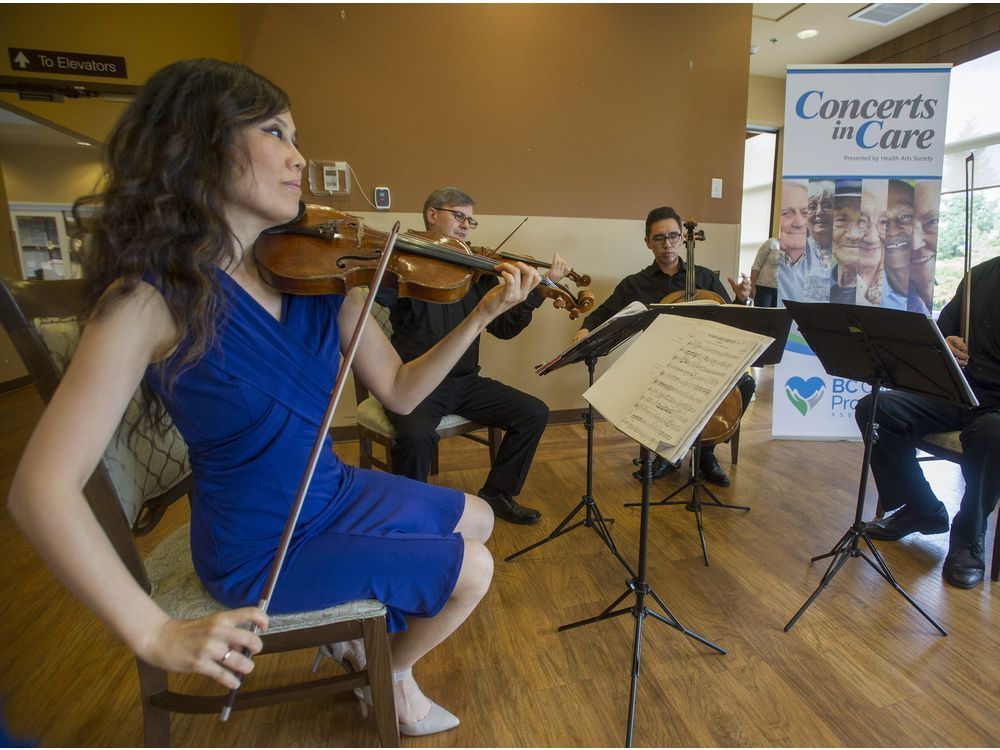With one thin, veined hand over the other, he tapped in time as the Borealis String Quartet played a very special concert.

Across the room, a woman nodded her head along with the beat, while a man closed his eyes, perhaps transported somewhere else. Still, another woman looked slightly alarmed as violinist Patricia Shih occasionally rose and twisted in her chair, fully engaged with the music.
Of course, there were critics. “They’re playing too loud,” a man said to the woman next to him, apparently believing that he was sotto voce.
But the applause was warm and generous for the quartet in residence at Kwantlen Polytechnic University, which has recently performed as part of the Beethoven series at the Metropolitan Museum in New York, and at the Illsley Ball Nordstrom Recital Hall in Seattle.
The concert at Chartwell Carlton Gardens was the first of two concerts that the quartet played Thursday in Burnaby. Both were in residential care homes where the average age of residents is upwards of 86, and most suffer from mild to acute dementia.
The scientific evidence is that the last of the brain receptors that are affected by acute dementia is the one for music. Beyond that, there is plenty of anecdotal evidence from staff and family that music has a calming effect.
But for David Lemon, it’s not about health benefits. It’s about pleasure.
“Music does for them what it does for everyone else. It give pleasure,” he said when we talked before the concert began. “It is extraordinarily rare not to be touched by music.”
Lemon, a former insurance executive and owner of Vancouver’s Magic Flute record store, founded the non-profit Health Arts Society in 2006 specifically to produce Concerts in Care for nursing home residents.
“Culture, leisure and recreation are taken for granted outside of care homes,” says Lemon. “We have to do better for the people who live here because we’re all on a trajectory. Age is not an illness. We change — fundamentally and remarkably — very little.”
By the end of 2017, the society will have produced 8,000 concerts in B.C. and hundreds more in the seven other provinces where Lemon has set up individual societies to ensure that the programs are tailored to local needs.
There’s been classical music, opera, jazz, special programming for audiences of different cultures and, in Saskatchewan, they’ve even done country and western. All of the performers are professional musicians.
“It would be condescending to say that those in residential care don’t get to have the best musicians performing for them,” Lemon says.
Concerts in Care slide show
Thursday’s performances were part of the 40-concert series funded by the B.C. Care Providers Association to mark its 40th anniversary celebration. Like Lemon, CEO Daniel Fontaine believes that it’s not enough to focus on the quality of care. There needs to be more attention paid to quality of life seniors have within these care facilities.
“I’d like to make things like this standard fare,” Fontane said before the concert began. “It shouldn’t only happen because David (Lemon) is able to stumble on a grant from here or there.”
The association wants the provincial government to establish a “quality of life fund” of $100 a month for each of the 27,000 B.C. residents in care homes to be used for recreational, therapeutic and social services that currently aren’t widely available.
The need for enhancement of those services was certainly reflected in the responses to a massive survey of residents and their families in 292 care homes, which was released last week by the B.C Seniors Advocate. It’s one of the report’s top three recommendations.
But the top priority is, and ought to be, on improved quality of care. Even though British Columbia is spending $1.9 billion on seniors’ long-term residential care this year, the quality of that care got mixed reviews.
A stunning 62 per cent of the 9,605 residents surveyed said they don’t get baths and showers as often as they’d like, while one in four rarely or only sometimes get the help they need when they want to go to the toilet.
But there is more to being human and being alive than simply eating, sleeping and breathing our way through each day as we inexorably head to the end.
And, like it or not, end-of-life care for our parents and for ourselves is going to take an increasingly large share of government spending over the next several decades.
Two years ago, the Conference Board of Canada forecast that by 2026 there would be a 71-per-cent increase in the number of seniors needing continuing care supports. By 2046, it estimates that spending will have to increase to $177.3 billion, from $28.3 billion in 2011.
As the demand rises, determining how to provide for all of the needs of aging citizens is an urgent priority.
—
Byline: Daphne Bramham, Vancouver Sun. Photo credit: Borealis String Quartet in the Concerts in Care performance. JASON PAYNE / PNG





